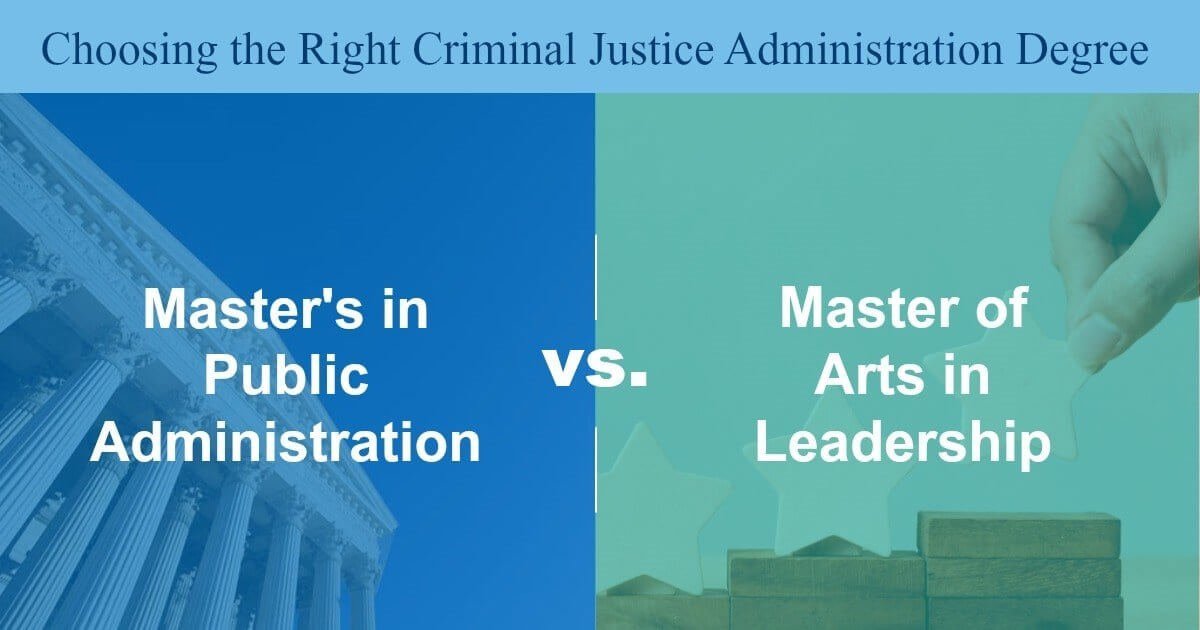There are many different motivations for a law enforcement or criminal justice professional who is seeking to earn a master’s degree focused on leadership.
In law enforcement and criminal justice, potential reasons to pursue an advanced degree include:
- Building/refining your skills to be more effective in a current managerial or executive leadership role
- Fulfilling a requirement for a promotion to lieutenant or higher position
- Positioning yourself to better compete for internal or external promotional opportunities
- Pursuing a post-retirement teaching career
But with so many master’s degree options focused on various aspects leadership — Master of Arts in Leadership, Master’s in Public Administration and even an MBA — how do you determine what master’s program is ideal for your unique situation?
Is a master’s degree in general leadership your best bet? Or would an advanced degree that is specifically tailored to criminal justice — say, a law enforcement leadership master’s — ultimately be more valuable?
To help you weigh the pros and cons of each, this post will compare three distinct master’s degree options:
- Master’s in Leadership (leadership curriculum with a focus on business and nonprofit organizations)
- Master’s in Public Administration (focus on management/leadership of public-sector organizations such as local, state and federal governments; non-governmental organizations and nonprofits)
- Master’s in Law Enforcement and Public Safety Leadership (a highly specific degree focused on developing leadership skills specific to a law enforcement agency or department)
Master’s in Leadership
A Master’s in Leadership or Master’s in Organizational Leadership degree is often contrasted with a Master of Business Administration (MBA) since both are regarded as solid options for managers and leaders seeking to move up the career ladder in business.
A leadership master’s will typically engage students in some of the business or management courses that are required to earn an MBA. However, such programs concentrate less on MBA-style marketing, accounting, finance, HR and operations management training; and more on such areas as:
- Organizational and team development
- Conflict and change management
- Behavioral motivation theories
- Strategic planning
- Decision-making
- Communication
- Coaching
- Leader-follower interactions
Though much of the subject matter holds value for leaders of law enforcement agencies and those working in criminal justice administration, you’ll want to weigh the fact that much of the curriculum and assignments will not be specific to your working environment, and that your degree program may or not include fellow students from your field with whom to network and exchange ideas.
Master’s in Public Administration
A Master’s in Public Administration (MPA) is a graduate degree program that focuses on preparing bachelor’s degree-holding professionals to serve as managers, policy analysts and executives in public-sector organizations (including law enforcement agencies) on the municipal, county, state and federal level, as well as in non-governmental organizations (NGOs) and nonprofits.
MPA programs are typically designed to help degree candidates become more effective leaders in solving public problems by equipping them with a deeper understanding of executive organization and management. Curriculum in MPA programs often includes courses on such subject matter as public finance, research methods, statistics, policy analysis, managerial accounting, ethics, public management, microeconomics, etc.
Students generally have the flexibility to tailor their MPA studies to particular public-sector fields of interest such as:
- Urban planning
- City management
- Emergency management
- Transportation
- Criminal justice
- Health care
- Environmental policy
- Economic development
- Community development
- Nonprofit management
However, since MPA programs are designed to encompass such a broad range of public-sector and nonprofit applications, courses such as those on environmental policy or nonprofit management might be required for the degree but not particularly relevant to your public safety or law enforcement leadership career goals. In fact, some experts consider this to be closer to a master’s in political science than to a master’s in law enforcement leadership or a master’s in criminal justice administration.
Master’s in Law Enforcement and Public Safety Leadership
In contrast, a master’s in law enforcement and public safety leadership or a master’s in law enforcement administration program will focus on serving those currently working in a municipal, county or federal public safety agency such as police, sheriff, corrections or homeland security. Students will take similar leadership courses to what might be offered in the other two degree programs detailed above, but the content, student learning outcomes and assignments will be tailored specifically to the law enforcement environment.
The curriculum is likely to include such courses as:
- Critical issues in law enforcement and public safety
- Communication for law enforcement leaders
- Public safety law
- Community engagement
- Conflict resolution and decision making
- Budget and finance for law enforcement leaders
Criminal justice professionals who are exploring this degree option should look for a program whose faculty is composed of instructors who possess career experience in the field (rather than purely academic); and whose curriculum has been developed in close collaboration with professional associations and individuals working on the front lines of law enforcement and public safety. An additional advantage: Programs that are thoughtfully tailored to your specific area of interest will connect you with robust networking and professional development opportunities.
Master’s in Leadership vs. Master’s in Public Administration vs. Master’s in Law Enforcement and Public Safety Leadership
| Master’s in Leadership |
Master’s in Public Administration | Master’s in Law Enforcement and Public Safety Leadership | |
| Intended For | Professionals from a variety of backgrounds and industries who are interested in organizational development and identifying ways to improve team effectiveness. | Professionals working in a variety of roles, usually in government agencies and NGOs, who aspire to management and leadership positions and/or seek to better understand and influence public policy. | Law enforcement professionals who are interested in becoming more effective leaders in their departments, and/or current law enforcement executives who wish to lead change and develop creative solutions to meet the evolving needs of their agencies and communities. |
| Coursework Focus Areas |
|
|
|
| Potential Career Paths or Organizations Degree Holders Work At |
|
|
|
Choosing Your Degree Program: Online vs. On-Campus
An additional consideration is whether you are looking to earn your degree on-campus at a local university or through one of the many online options available today. You may find, after evaluating several degree programs, that an online degree program at a top-ranked, regionally accredited university is just as rigorous as a campus-based degree (perhaps more so, depending on the options available in your community). Additionally, online degrees are identical to campus-based degrees in the eyes of employers, and provide far greater flexibility to balance your family obligations and unpredictable work schedule with your studies.
For example, the Master’s in Law Enforcement and Public Safety Leadership program offered online by University of San Diego (USD) is highly regarded because USD is a top-ranked university that is regionally accredited and known for its academic rigor. The program has earned the praise of graduates representing a wide range of law enforcement and criminal justice organizations, and has been ranked by US News & World Report as one of the country’s best online criminal justice master’s degree programs. The online format allows law enforcement professionals from all over the U.S. to earn a valuable graduate degree from a reputable university, while continuing to maintain their work and family commitments.
[RELATED] Career Advice from Two Former Police Chiefs >>
Law Enforcement Leaders Discuss the Value of Advanced Education
San Gabriel, Calif., Police Chief Eugene Harris had already earned a master’s in organizational management before enrolling in the USD law enforcement master’s degree program, which he credits with helping him earn his current position.
“As a person who was motivated to seek a command position, it was really important for me to understand the depths of leadership,” said Chief Harris. “You’re dealing with instructors who challenge you to get to the next level.”
Ryan Flick, a Lieutenant Watch Commander at the Department of Defense in Oceanside, Calif., had earned a master’s degree in human behavior before his chief encouraged him to pursue his master’s in law enforcement leadership with USD to help him achieve his career goals.
“I would recommend USD’s MS in Law Enforcement and Public Safety Leadership degree over a lot a lot of other conventional criminal justice or MBA programs,” he said, touting the benefits of learning alongside other high-ranking law enforcement officials. “Their feedback in the course is just exceptional,” he said. “The stuff that you can get from their experience is tremendous — you don’t get that in normal classes.”
Gary Morrison, a former chief of police in Carlsbad, Calif., who had earned his master’s degree in organizational leadership, is now an instructor in the University of San Diego master’s program. “I like to say that what we teach is what I did every day as a law enforcement supervisor and executive manager.”
The program’s online format, he said, “gives the student structure, yet flexibility for personal and professional life issues that can occur,” as well as “a national perspective from peers across the country, each sharing their unique perspective.”
“Leadership and learning are indispensable to each other.”
– President John F. Kennedy





